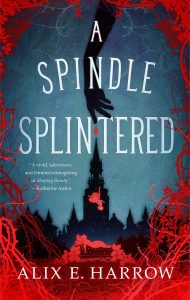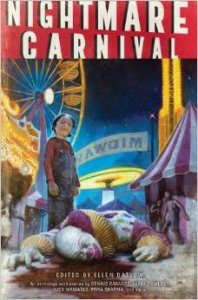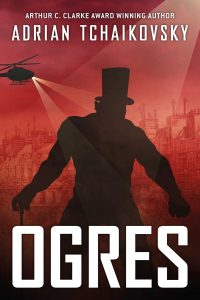Gary K. Wolfe Reviews A Spindle Splintered by Alix E. Harrow
 A Spindle Splintered, Alix E. Harrow (Tordotcom 978-1-250-76335-2, $17.99, 128pp, hc) October 2021.
A Spindle Splintered, Alix E. Harrow (Tordotcom 978-1-250-76335-2, $17.99, 128pp, hc) October 2021.
There are two reasons why fairytale retellings and adaptations have remained consistently popular for centuries: one is that these old tales are deeply beloved, and the other is that they aren’t – or that they could use some serious fixing. Alix E. Harrow, or at least the narrator of her novella A Spindle Splintered, evidently falls into the latter category. She begins by telling us that ‘‘Sleeping Beauty is pretty much the worst fairy tale, any way you slice it. It’s aimless and amoral and chauvinist as shit.’’ That narrator has good reasons for feeling somewhat bitter about a princess whose chief skill is being unconscious: Zinnia (or Zin) Gray is dying, the victim of a rare genetic condition called Generalized Roseville Malady, named after her town in Ohio and caused by some sort of corporate environmental malfeasance. No one with the condition has lived to be 22, and the story opens on Zinnia’s 21st birthday. While that inevitably generates a sense of urgency, it also feels like a pretty arbitrary setup for a tale which is largely critical of the arbitrary rules of fairy tales. Feeling the pressure of time, Zinnia not only finished high school early, but has completed a college degree in folklore, which gives her a useful dual perspective on what’s about to happen to her.
Zinnia’s best friend Charm has set up a fairytale-themed surprise party for her birthday, complete with a spinning wheel, and when Zin pricks her finger on the spindle, she awakes in the world of Princess Primrose of Perceforest (a reference to one of the oldest versions of Sleeping Beauty), who, apparently having just evaded the curse of the wicked fairy, is about to be married off to the smug and boring Prince Harold. Realizing she’s arrived in ‘‘Fake-ass Medieval Fairy Land’’, Zin convinces Primrose that they can take control of the tale by tracking down the wicked fairy herself. Along the way, they’re able to enlist the aid of various alternate iterations of Sleeping Beauty (who Zin recognizes from her thesis research, and who include a space princess complete with blaster and a delightfully kick-ass Brunhilda). Throughout this, Zin is able to keep in touch with the sarcastic and witty Charm via text messages, which, remarkably, seem to work between universes.
If there’s a spoiler for the plot of A Spindle Splintered, it’s right there in Harrow’s lovely opening dedication ‘‘for everyone who deserves a better story than the one they have,’’ but the plot is hardly the main point here. Zin’s lively narrative voice, which is anything but doom-laden, along with the equally acerbic voice of her friend Charm (for Charmaine, and clearly another fairy tale reference) and the story’s wealth of allusions and critiques of fairytale conventions (is her old college professor Bastille a subtle reference to the early tale-collector Basile?) are what lend the tale its undeniable charm. As with any tale of an apparently doomed young woman – or for that matter any tale that tries to negotiate between the contrived worlds of faerie and grim realities – Harrow needs some fancy narrative footwork to avoid a compromised or cop-out ending, but she manages it with the same sort of cheerful panache with which Zin faces her own future. Cleverly adorned with details from Arthur Rackham’s famous silhouette illustrations, A Spindle Splintered is a subversive delight.
Gary K. Wolfe is Emeritus Professor of Humanities at Roosevelt University and a reviewer for Locus magazine since 1991. His reviews have been collected in Soundings (BSFA Award 2006; Hugo nominee), Bearings (Hugo nominee 2011), and Sightings (2011), and his Evaporating Genres: Essays on Fantastic Literature (Wesleyan) received the Locus Award in 2012. Earlier books include The Known and the Unknown: The Iconography of Science Fiction (Eaton Award, 1981), Harlan Ellison: The Edge of Forever (with Ellen Weil, 2002), and David Lindsay (1982). For the Library of America, he edited American Science Fiction: Nine Classic Novels of the 1950s in 2012, with a similar set for the 1960s forthcoming. He has received the Pilgrim Award from the Science Fiction Research Association, the Distinguished Scholarship Award from the International Association for the Fantastic in the Arts, and a Special World Fantasy Award for criticism. His 24-lecture series How Great Science Fiction Works appeared from The Great Courses in 2016. He has received six Hugo nominations, two for his reviews collections and four for The Coode Street Podcast, which he has co-hosted with Jonathan Strahan for more than 300 episodes. He lives in Chicago.
This review and more like it in the October 2021 issue of Locus.
 While you are here, please take a moment to support Locus with a one-time or recurring donation. We rely on reader donations to keep the magazine and site going, and would like to keep the site paywall free, but WE NEED YOUR FINANCIAL SUPPORT to continue quality coverage of the science fiction and fantasy field.
While you are here, please take a moment to support Locus with a one-time or recurring donation. We rely on reader donations to keep the magazine and site going, and would like to keep the site paywall free, but WE NEED YOUR FINANCIAL SUPPORT to continue quality coverage of the science fiction and fantasy field.
©Locus Magazine. Copyrighted material may not be republished without permission of LSFF.






